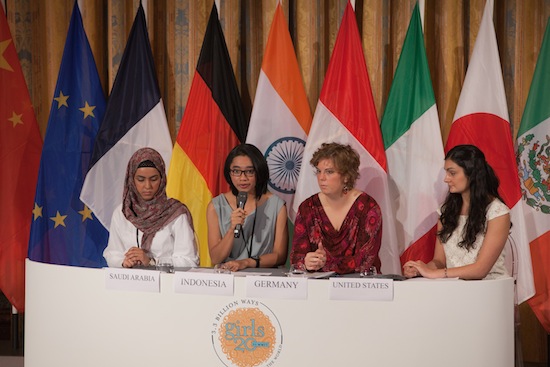It's always frustrating when the math doesn't add up. Especially basic math.
Women make up slightly more than 50 percent of the world's population, yet when you look at the political positions that represent a nation, it hovers around 20 percent (women hold 25 percent of the seats in Canada's House of Commons, make up just 17 percent of U.S. Congress, and represent only 20 percent of G20 leadership).
Considering the endless list of problems the world faces today, from the economy to the environment, we could really use some new voices, fresh ideas and diverse perspectives.
Since a young age, I've always put myself in male dominated spaces, from being one of the first women in my neck of the woods to snowboard, to my first job out of university in the digital and technology sector. And I have always been welcomed warmly. But I've been trying to figure out how to balance out the numbers beyond my personal involvement in what appear to be boys clubs, and am convinced one of the best ways to promote gender equality is by actively grooming and developing female talent.

G(irls)20 Summit 2011 France Delegates
(L-R) Saudia Arabia, Indonesia, Germany & US present the communiqué
So when the G(irls) 20 Summit was born back in Toronto in 2011, in the lead up to Canada's G20 Summit, I dove at the opportunity to get involved. I wondered, what would the G20 look like if it was run by girls? Imagine I had such an opportunity at just 18? And have we ever really given girls the opportunity to address the world issues that we've actually created for them?
I feel I have the best gig at the G(irls)20 Summit, that of moderator. My role is to work with the delegates in the only in-camera session at the conference, chairing the debate. This year the focus is on the opportunity gained by strategically engaging women in agriculture and the opportunity lost as a result of violence against women. During this time, which usually ends up being an all-day and all-night affair, the delegates draft and circulate working papers, building on their week attending panels and workshops at the summit. This is where their diplomacy skills shine. The end goal is developing a communiqué.
It is this communiqué that offers a recommendation from G(irls)20 to the G20. It's presented to the media in a formal press conference at the end of the summit, this year on Friday, June 1, 2012, led by the girls themselves.
Last year in Paris, France, the delegates had this to say:
For a reference point, take a look at the communiqué from the official G20 Leaders Summit in Cannes, presented last November.
As someone who has the privilege of watching the delegates in action, debating policy and developing partnerships, as they explore creative solutions to some of the world's biggest problems, I know it's only a matter of time. The G(irls)20 Summit is a preview. Remember their names, because it should come as no surprise when we see these young women again in 30 years, at the actual G20 Summit. Look for their faces in those G20 group photos, when there will be so many female leaders, we can finally stop counting.
Jennifer Hollett just completed her Master of Public Administration at Harvard University's John F. Kennedy School of Government. She's worked as a broadcast journalist in Canada at CBC, CTV and MuchMusic.
